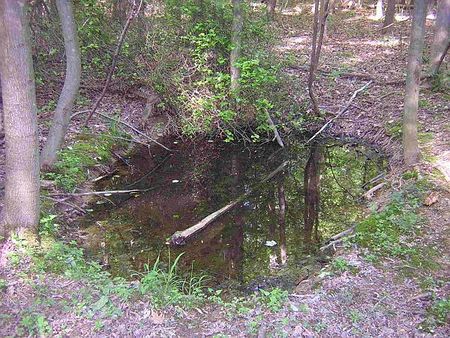Vernal Pools: Difference between revisions
No edit summary |
No edit summary |
||
| Line 1: | Line 1: | ||
==Overview== | ==Overview== | ||
[[File:VernalPool1.jpg|450px| | [[File:VernalPool1.jpg|450px|right|thumb| A vernal pool in Sligo Creek Park. [2] ]] | ||
A vernal pool is a seasonal pool of water that is typically characterized by being relatively small, shallow, and ephemeral. A vernal pool is filled in the spring by rain and snowmelt, and then dry up when summer comes around. These pools can last longer if the soil beneath them is made up of fine silt; Making the percolation rate slower. These pools can form not only near other wetlands, but in any low lying area with a soil structure that is capable of holding water for a short period of time. Vernal pools have been found on the tops of upland areas, woodlands, and urban areas. When considering the characteristics of vernal pools, it is evident that vernal pools are unique wetland ecosystems. | |||
==How They Form== | |||
==References== | |||
[1] | |||
[2] Murtagh, Ed. “Vernal Pools.” Friends of Sligo Creek, Takoma Park Newsletter, Aug. 2004, www.fosc.org/VernalPool.htm. | |||
Revision as of 22:15, 10 May 2018
Overview

A vernal pool is a seasonal pool of water that is typically characterized by being relatively small, shallow, and ephemeral. A vernal pool is filled in the spring by rain and snowmelt, and then dry up when summer comes around. These pools can last longer if the soil beneath them is made up of fine silt; Making the percolation rate slower. These pools can form not only near other wetlands, but in any low lying area with a soil structure that is capable of holding water for a short period of time. Vernal pools have been found on the tops of upland areas, woodlands, and urban areas. When considering the characteristics of vernal pools, it is evident that vernal pools are unique wetland ecosystems.
How They Form
References
[1]
[2] Murtagh, Ed. “Vernal Pools.” Friends of Sligo Creek, Takoma Park Newsletter, Aug. 2004, www.fosc.org/VernalPool.htm.